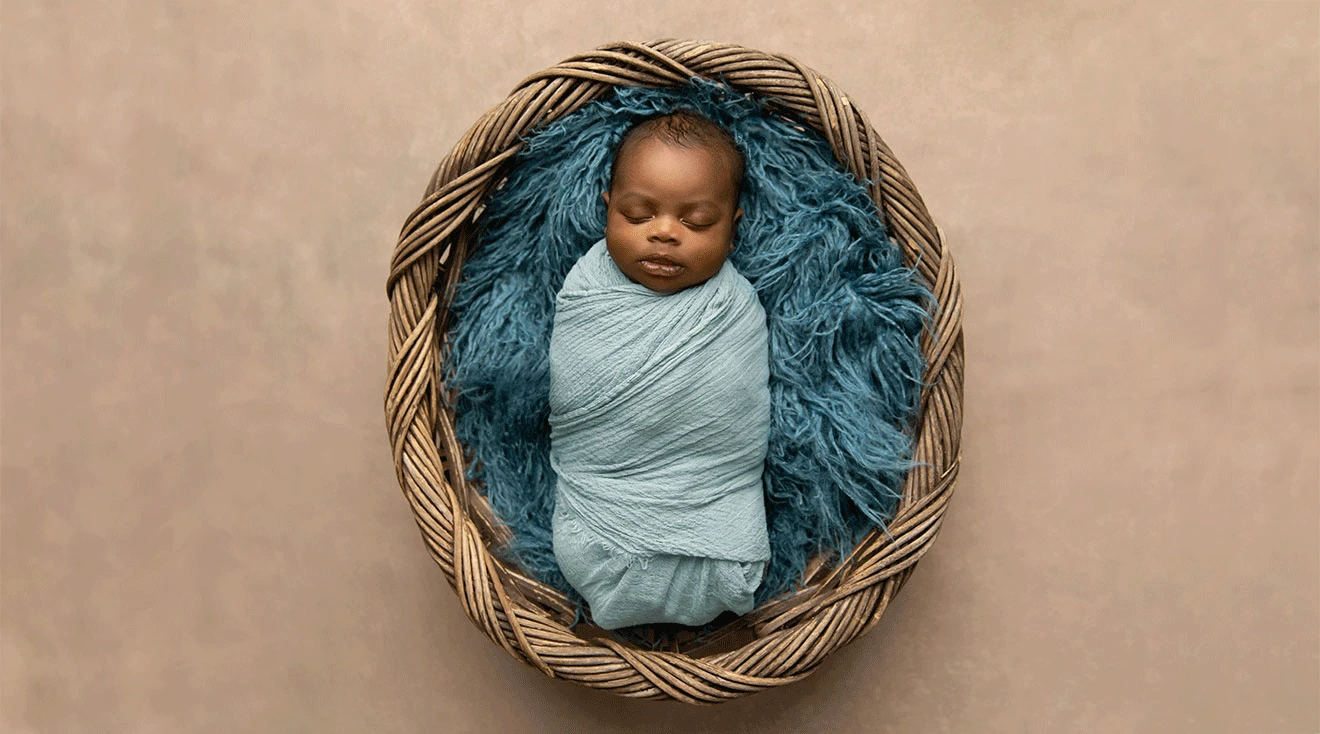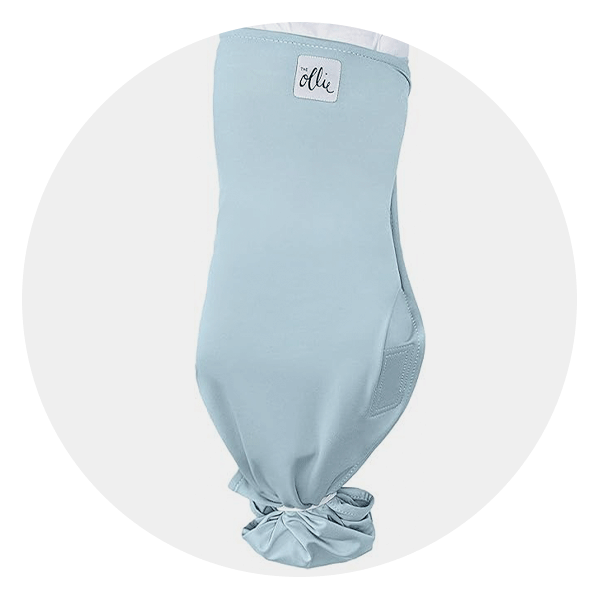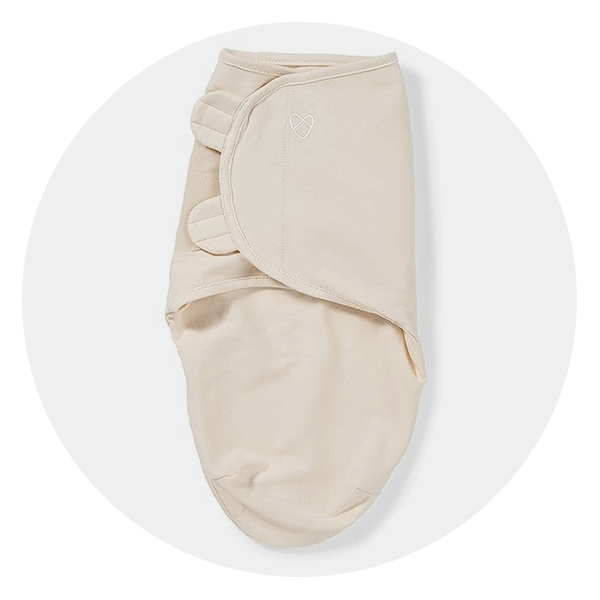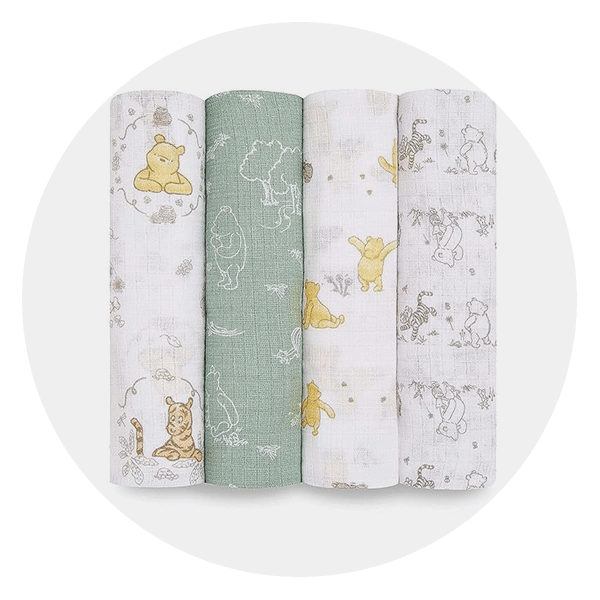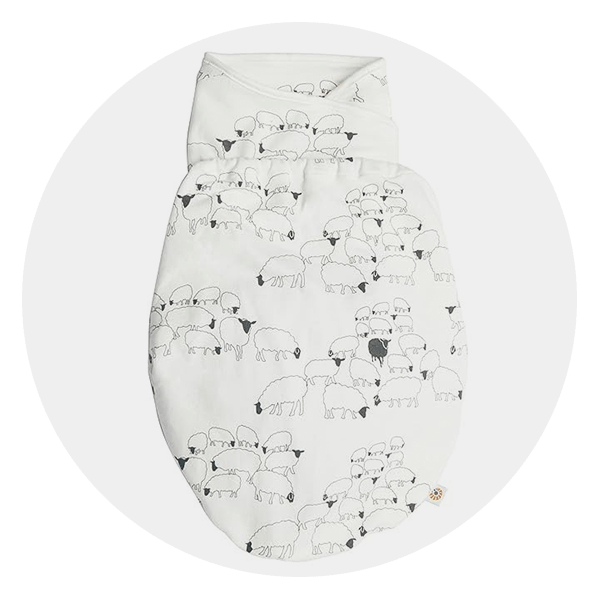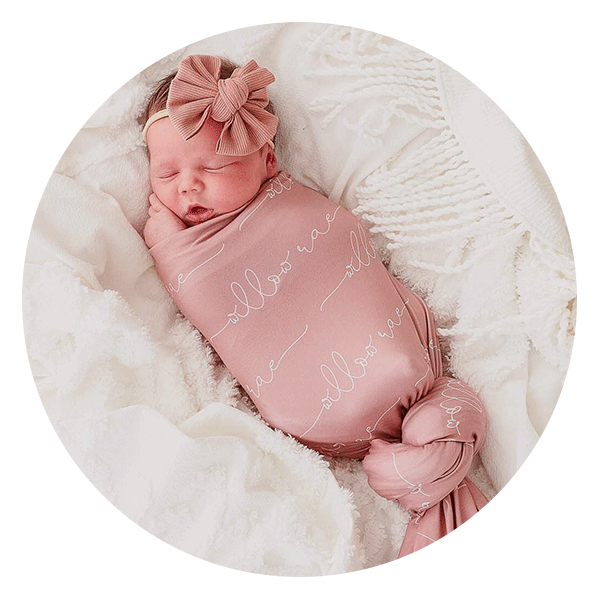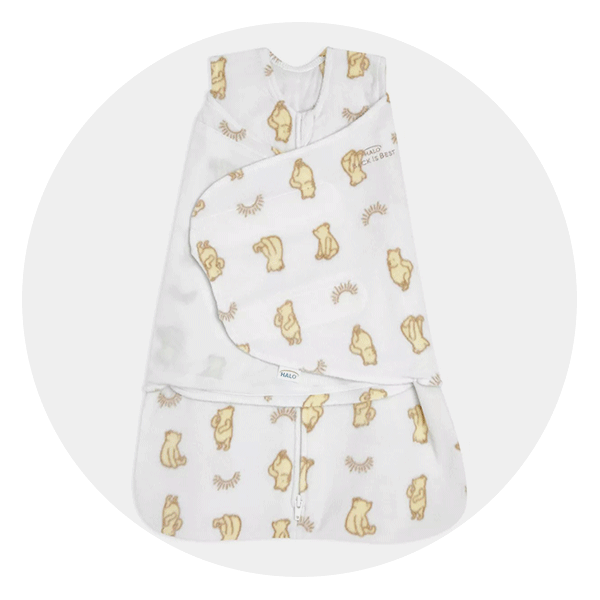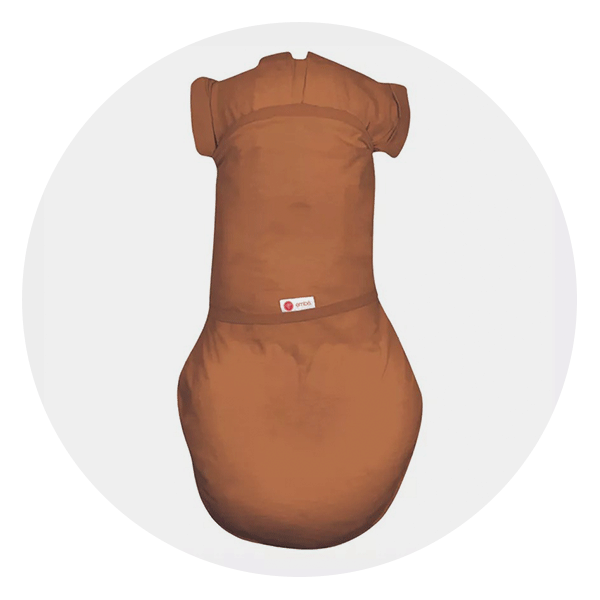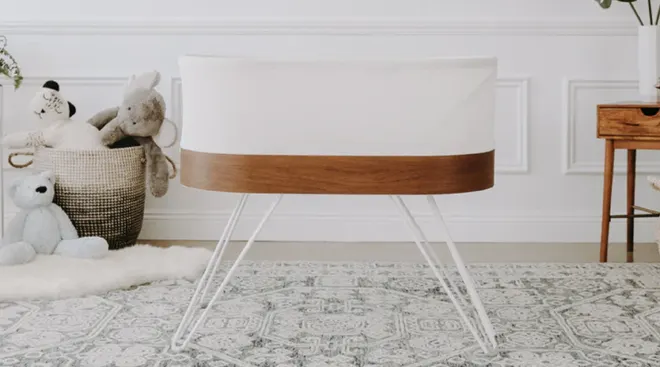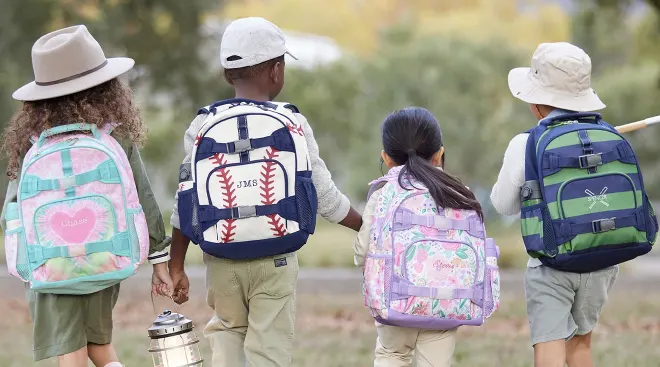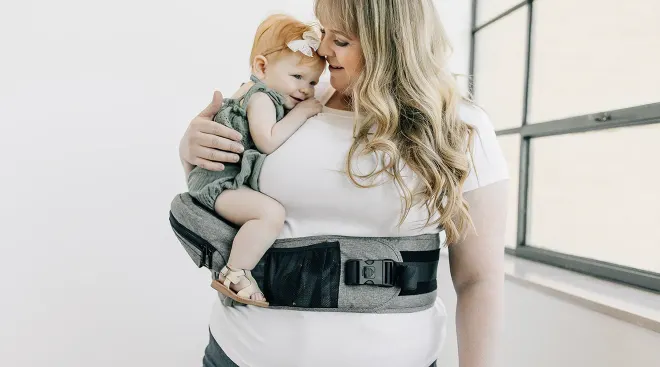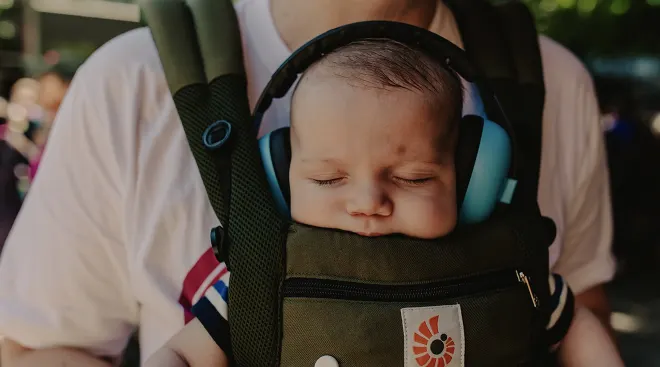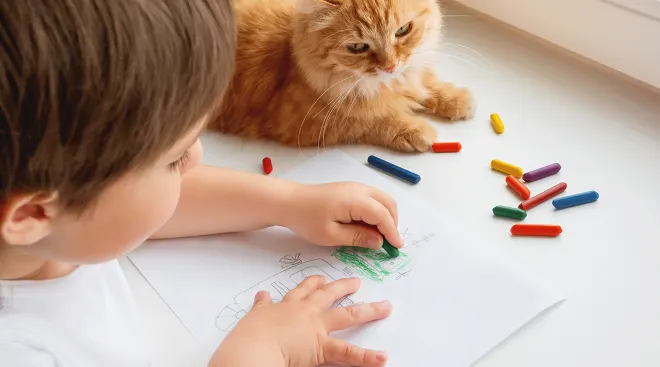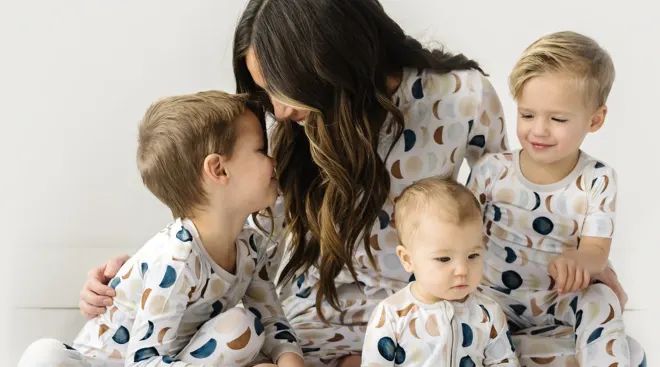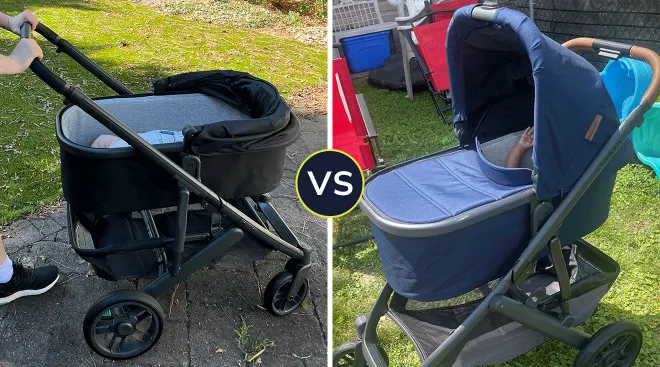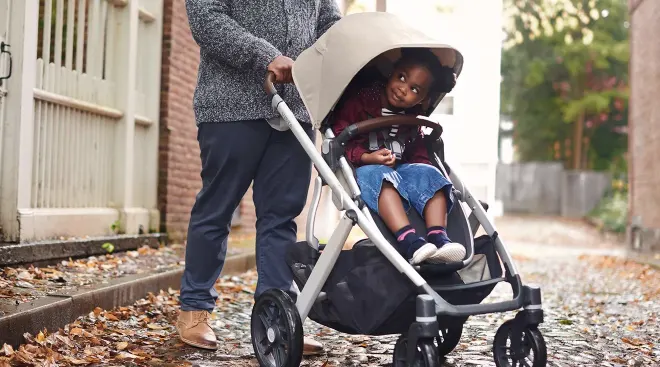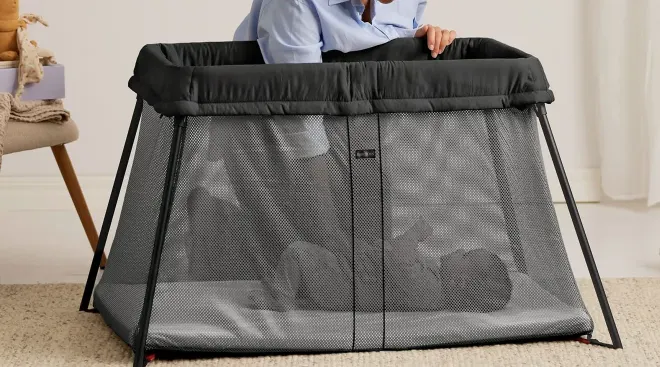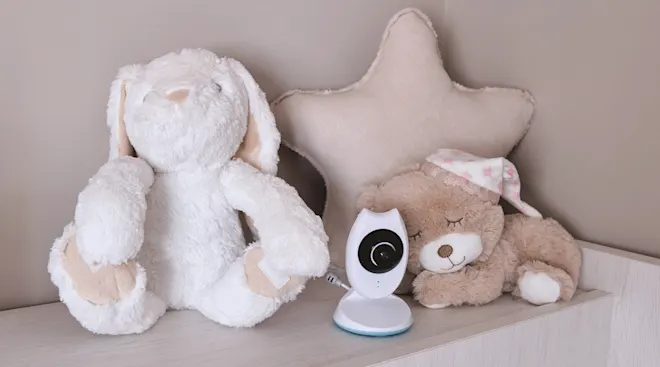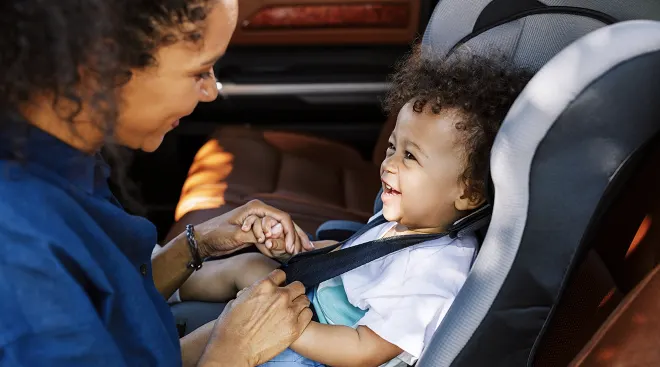The Best Baby Swaddle Blankets to Keep Baby Sleeping Soundly
One of the cutest things you’ll probably ever see is a sleeping baby swaddled up like a burrito. But swaddle blankets aren’t just decorative wrapping; they’re meant to help infants feel settled. “Swaddling is thought to help calm a newborn baby and improve sleep,” says Carrie M. Brown, MD, a pediatrician at Arkansas Children’s Hospital in Little Rock, Arkansas. “Most babies will sleep more soundly if swaddled than left with their arms loose.”
Brandi Jordan, MSW, IBCLC, a pediatric sleep specialist and founder of The Cradle Company, tell us, “[Swaddling] mimics what babies felt in utero, and it can help with increasing their sleep times and acclimating them to living outside of mommy’s tummy.” Not only does it help recreate the warm, snug environment of Mom’s womb, but swaddling can also help babies sleep safer at night. Below, we’ll walk you through our top picks for the best swaddle blankets available, as well as the types of swaddle blankets available, how to use them and what to look for when shopping.
As a parent, finding a swaddle for your newborn or infant that balances comfort, safety and security can be a daunting task. Our goal is to do the bulk of the research, so you don’t have to spend hours searching online. We do this by considering a list of criteria such as material, TOG rating, breathability, versatility, comfort, hip-friendliness, ease to put on and ease of cleaning, style, value and, first and foremost, safety. To ensure your baby’s health and welfare were prioritized above all else, we consulted with a pediatrician and a pediatric sleep consultant, as well as the most up-to-date safe sleep recommendations from the American Academy of Pediatrics (AAP). We also read user reviews, thoroughly analyzed each of our favorite swaddle options to find out how they worked for real-life families and didn’t consider anything with less than an average four-star rating.
Interested in learning more about our editorial process? Read about how our team develops and reviews all articles here.
Your hospital may have used a thin, cotton blanket for swaddling your newborn. You can, and should, take a few home with you—they’re free (plus, the pink and blue striped hospital blankets are iconic)! But if you’re not a swaddle ninja like those nurses, there are plenty of other, more feature-packed options. Check out our picks for the best swaddle blankets on the market today.
Overall best swaddle for newborns
- Individualized fit
- Smooth transition to arms-out sleep
- Bottom opening for changing
- Pricey
- Velcro may startle sleeping baby
The Ollie World Swaddle—a multi-time Best of Baby award winner —is a perennial parent favorite for good reason. Its patented moisture-wicking fibers stretch to allow freedom of movement while still keeping your little one safely contained. It wraps around your little one like a true swaddle blanket, meaning it easily adjusts to baby’s size (great for tiny newborns!), and quickly and securely fastens with Velcro closures. The bottom is gathered together with an elastic band, which can be quickly opened for late-night diaper changes. It can even be fastened with baby’s arms either in or out, making it an ideal transitional swaddle.
Material: 86% polyester/14% spandex | TOG rating: 0.8 | Care instructions: Machine wash, tumble dry
Best swaddle for preemies
- Ideal for small babies
- Hip-healthy design
- Womb-like snug feel
- Inexpensive
- Suitable for warmer climates
- Velcro may startle sleeping baby
Swaddling is easy with Summer Infant’s SwaddleMe, which secures across baby’s body with hook-and-loop closures. This Velcro swaddle blanket is designed specifically for babies up to seven pounds and lets you adjust the tightness of the swaddle, depending on baby’s size and preference.
Material: 100% cotton | TOG rating: 0.5 | Care instructions: Machine wash
Best muslin swaddle blanket
- Extremely breathable
- Available in multi-packs
- Great prints and colorways
- Wide availability
- No zippers and/or Velcro closures
- Best for warmer climates
The aden + anais swaddle is a cult classic among parents for many reasons. The blankets are large, the patterns are killer-cute and you can use one for countless other baby tasks: as a stroller blanket, an on-the-fly changing mat, a tummy time spot on the floor, a nursing cover, an emergency burp cloth—you name it, these muslin swaddle blankets have done it.
Material: 100% cotton muslin | TOG rating: 1.0 | Care instructions: Machine wash cold, tumble dry low
Best Bamboo Swaddle Blanket
- Great gift idea
- Gentle on sensitive skin
- Sweetest prints and colorways
- Pricey
- Suitable for warmer climates
- Limited-edition prints
This swaddle blanket set is silky smooth, lightweight, breathable and perfectly stretchy—plus, the bamboo is naturally absorbent, anti-microbial and odor-resistant, all of which are ideal for a newborn's sensitive skin. And who can resist the little hat and/or headband that comes with it? We’re big fans of Little Sleepies’ family matching pajamas, and their swaddle sets fit right into the mix (and match).
Material: 95% viscose from bamboo/5% spandex | TOG rating: N/A | Care instructions: Machine wash cold
Best organic swaddle blanket
- Lightweight and breathable
- Bespoke prints for modern nurseries
- Ethically made
- Softer after each wash
- Pricey
Given the burrito wrap of a swaddle, it’s sure to be snug against baby’s skin. That’s why an organic swaddle blanket, that’s free of any irritating or harmful chemicals, makes total sense. Pehr’s Organic Swaddles bring infants the cleanest comfort: not only prioritizing safety and non-toxicity, but bringing a touch of whimsy and charm to your nursery with their adorable prints. But what we’re most impressed with is the careful attention to detail in every design: Each airy swath is thoughtfully screen-printed by hand, using AZO-free dyes, ensuring a safe and gentle touch against baby's precious skin.
Material: 100% organic cotton | TOG rating: N/A | Care instructions: Machine wash cold, tumble dry low
Best zippered baby swaddle
- Parent-verified, extra-quiet Velcro
- Breathable mesh prevents overheating
- Can pill easily
- Velcro needs securing before washing
- Not compatible with the SNOO
When it’s 4 a.m. and you’ve just changed a less-than-easy diaper and just want your little one to go to sleep, you want to get them back down fast. Enter: the Sleepea 5-Second Baby Swaddle. The easy-to-use zipper creates a snug, safe and simple wrap for your baby, reducing their startle reflex and promoting better sleep.
Sleepea’s inner flaps give babies the womb-like embrace they love while keeping them from escaping. Seriously, even if you have a little Houdini on your hands, they’re not getting out of this incredibly-genius swaddle matrix thought up by none other than Harvey Karp, renowned baby sleep expert and creator of the SNOO (which snagged a Best of The Bump award in our roundup of best bassinets). Great for newborns who want to feel that comfy-cozy level of snug, but also great for safe, arms-out swaddling once baby gets a little older.
Material: 100% cotton | TOG rating: 0.5 to 0.8 | Care instructions: Machine wash cold, tumble dry low
Best arms-up baby swaddle
- Womb-like four-way stretch
- All-season comfort
- Ideal for swaddle-averse babies
- Not suitable for hyper-sensitive startle reflexes
Ever notice how some babies naturally sleep with their arms up over their head in a “victory” position? This zip-up, arms-up swaddle sack is built so baby’s arms stay in that comfy, raised position. It’s also flexible enough that if baby wants to move their hand to their mouth for self soothing, they can—it’s got more give in the arms than your average newborn swaddling blankets. This cotton swaddle also has a two-way zipper for fast diaper changes.
Material: 93% cotton/7% spandex | TOG rating: 1.0 | Care instructions: Machine wash gentle, tumble dry low
Best hip-friendly swaddle blanket
- “Hip-healthy” acknowledgement from International Hip Dysplasia Institute (IHDI)
- Escape-proof arm pockets
- Soft and breathable
- Looser design
- Leg-separating strap limits pajama choices
This brand’s take on swaddle blankets encourages baby’s legs to be in the M-shaped frog position (with room for them to move freely), which is recommended by pediatricians to prevent dysplasia and champion healthy hip development. The removable bottom piece can also lift for quick diaper changes, while the pocket sleeves help securely hold baby’s arms.
Material: 100% cotton | TOG rating: 0.5 | Care instructions: Machine wash
Best personalized swaddle blanket
- Double-sided for two looks
- Coordinates with other layette options
- Great for coming home outfits
- Pricey
- No zippers or Velcro
When it comes to personalized swaddle blankets, no one does it better than Caden Lane. We're completely smitten with their baby name swaddle blankets, which come in an array of gorgeous colorways. Their collection can be customized with baby’s first and middle name or just one name, and you have options with your typography. The buttery soft material is truly unmatched, and with that poly-spandex blend of fabrics, you know the stretch is solid.
Material: 95% polyester/5% spandex | TOG rating: N/A | Care instructions: Machine wash cold, air dry
Best winter swaddle
- “Hip-healthy” acknowledgement from IHDI
- Stylish prints and colorways
- Custom fastening and adjustability
- High TOG rating
- Shrinks easily
- Bulky fabric
Halo has taken the origami aspect out of swaddling by making their swaddle blankets foolproof: you zip baby into a Halo swaddle sack, then fold over the “wings” to keep their arms by their side and secure it with Velcro. Once baby outgrows the swaddle suit, it turns into a safe, wearable blanket. They’re offered in cotton and muslin as well as micro-fleece, which is a perfect swaddle material for winter or cooler climates.
Material: 100% polyester | TOG rating: 3.0 | Care instructions: Machine wash
Best transition baby swaddle
- “Hip-healthy” acknowledgement from IHDI
- Customizable design
- Soft and breathable comfort
- No-rise neckline
- Diaper changes are hard
- Pricey
Once baby is approaching that three- to four-month mark, you’ll want to start transitioning them into a fully arms-out sleep situation. That said, it’s a process, and Jordan says you’ll want to take it little by little. “Start with one arm out at bedtime, and then transition to a sleep sack once baby has acclimated and is sleeping well with that one arm out.”
We’re big fans of the embe swaddle’s innovative and highly versatile design: It allows baby to sleep with one or both arms in or out, as well as legs in or out. It also offers a roomy, hip-friendly leg pouch that can be adjusted to three different lengths as baby grows, thanks to the clever snaps. The swaddle sack zippers shut and the flaps Velcro closed, making it easy and secure. It even boasts a neckline specifically designed so it doesn’t rise up and cover baby’s face. To top it all off, the machine-washable, 100 percent cotton swaddle regulates temperature and comes in a bunch of trendy colors.
Material: 100% cotton | TOG rating: 0.5 | Care instructions: Machine wash, tumble dry
After spending nine+ months in the tight, cozy quarters of the womb, newborns can find their new, spacious environment a bit startling—which doesn’t bode well for a good night’s sleep. It makes sense, then, that many infants enjoy the gentle, reassuring restrictions of a swaddle. To quell a fussy baby when it’s time to rest—or to stretch the amount of time your sleeping baby stays down—give swaddle blankets a try.
Not only that, but swaddle blankets can help calm newborns’ startle reflex, which, when triggered, causes baby to flail their arms and legs and often rouses them from sleep. This reflex is “due to the lack of the development of the myelin sheath, which is a fatty layer that covers neurons in the brain,” Jordan explains. “Those jerky movements that present with the startle reflex are connected to those neurons jumping around, as opposed to smoothly going from one neuron to the next.” Because the startle reflex can be set off by quick changes in position, a great way to keep it in check is by swaddling baby.
Swaddling babies is a centuries’ old practice, but the modern-day version of swaddle blankets is a bit more sophisticated than strips of cloth tied together that babies of yesteryear had to put up with. These days, the best swaddle blankets come in a variety of styles, colors and fabrics to suit baby’s needs. These are two main types of swaddle blankets you can choose from:
-
Baby swaddle wraps. Typically square-shaped and made of muslin or cotton, these swaddle blankets call for the hospital-wrap method of bundling baby like a little burrito—you won’t find any snaps, zippers or Velcro closures here. They’re great for versatility but require a multi-step swaddling process and may become loose if not wrapped properly.
-
Baby swaddle sacks. For parents who prefer to take the guesswork out of swaddling, a swaddle sack or swaddle pod is the answer. These feature zippers, snaps or hook-and-loop closures to keep baby bundled up inside, making swaddling much easier and faster. Plus, if they have two-way zippers, you can handle middle-of-the-night diaper changes without having to completely remove the swaddle.
Keeping safety in mind above all else, here are a few features you’ll want to keep an eye out for when shopping for the best swaddles:
-
Breathability. According to Jordan, “breathability is the key to swaddle shopping, as you can always ensure warmth for baby with the clothing you choose to sleep them in”—but if the swaddle is too stuffy or constricting, it can reduce proper airflow for baby. Look for swaddle blankets crafted from soft, lightweight and breathable fabrics like muslin cotton or moisture-wicking bamboo.
-
TOG rating. You’ll also want to pay special attention to the thermal overall grade (TOG) ratings, which tell you how warm the swaddle will be. Higher TOG ratings are best used in colder climates or on cooler nights, while lower TOG ratings are better for warmer climates or particularly hot summer evenings.
-
Functionality. Some swaddles are for newborns adjusting to life outside the womb, while others are for babies transitioning out of the full-on swaddle phase and into more freestyle sleep. If you’re looking for a swaddle for their first few months of life, you’ll want to go for one that can wrap baby up snuggly with their arms at their side; for preemies, you can have their arms bent and placed on top of their chest (with hands closer to their face). If you need a transitional swaddle, look for one that lets baby sleep with one or both arms free.
-
Comfort and safety. Pay attention to the manufacturers’ age recommendations and maximum weight limits for every swaddle blanket. Swaddles are not a one-size-fits-all garment; rather, they typically come in small, medium and large options that correspond with baby’s age and weight. Swaddles that are too big or wrapped too loosely not only “waste the effects of that cocooning and calming the swaddle provides,” Jordan says, but also create a suffocation hazard if it ends up covering their face. This is also why she warns against makeshift swaddles. “Babies should be swaddled in products from reputable manufacturers versus DIY or homemade designs to ensure all safety standards have been met,” she says. Brands have to put their swaddles through rigorous testing and trials to be deemed safe for newborns.
-
Leg room. Jordan also recommends finding swaddles that wrap securely around baby’s arms but allow the legs and hips to move freely, to avoid the risk of hip dysplasia. You can usually check for hip-friendliness in the product details.
-
Ease of use. Swaddles with adjustable openings at the bottom or two-way zippers (that can be zipped down or up) allow for easy diaper-changing access. And if those middle-of-the-night changes or feedings (and subsequent spit-up stains) end up soiling your swaddle, you’ll also want an easy way to clean it. Machine-washable for the win!
Jordan encourages parents to begin swaddling their baby from day one—even in the case of preemies. The comfort and calm that can come from being swaddled is no different for a premature newborn versus a full-term newborn, and since adequate rest is just as important, being able to increase sleep is a huge win (for both baby and parents). Head here for step-by-step instructions on how to wrap baby in a swaddle.
Once baby starts to (or attempts to) roll over, it’s time to stop swaddling—otherwise, it can create a suffocation hazard. A swaddled baby who rolls over onto their stomach can’t free their hands to push up and reposition their face for air. Babies can roll over as early as 2 months of age, but it’s more typical to see successful rolling between 3 and 4 months. You may be nervous to drop the swaddle, especially if you’d had good success with one, but babies start rolling over around the same time that their startle reflex is becoming less pronounced. “As baby receives nutrients via breast milk or formula, that fatty layer on their brain becomes more developed and insulative: It relaxes the firing neurons and leads to the reduction and calming of that primal startle reflex,” Jordan says. “Lots of tummy time and exposure to stimuli such as noises and lights will be helpful to acclimate baby” to their new swaddle-free life.
While swaddle blankets can be a lifesaver, there are safety tips to keep in mind before you start using them: Most babies enjoy being swaddled—that’s why hospital nurses do it. But it’s possible baby will object once they’re home. Sometimes it’s as simple as switching the swaddle blankets you’re using. Or, baby may simply need to get used to your swaddling technique, so don’t let the first few fussy swaddle sessions dissuade you.
Make sure the swaddle is secure; you don’t want it coming undone overnight, as that becomes a suffocation hazard. Leave room for baby’s legs to freely move about, to avoid potential hip problems. When they’re around 2 to 3 months old, babies generally want (and need) their arms free. You can swaddle baby with or or both arms out (depending on the type of swaddle blanket you’re using) or transition to a wearable blanket to keep baby warm. A swaddle or wearable blanket and a fitted crib sheet are the only bedding you should use in the crib or bassinet. Keep bumpers, loose blankets, pillows and stuffed animals out of the crib for a safe sleep environment.
Plus, more from The Bump:
Carrie M. Brown, MD, is a pediatrician at Arkansas Children’s Hospital in Little Rock, Arkansas. She received her medical degree from Ross University School of Medicine, and completed her residency through the Central Iowa Health Systems Program.
Brandi Jordan, MSW, IBCLC, is a postpartum doula, pediatric sleep specialist and founder of The Cradle Company. She holds a Bachelor of Arts in child development and a Master’s of social work from USC, where she is also an adjunct faculty member. In 2018, Brandi founded the National Association of Birth Workers of Color.
Navigate forward to interact with the calendar and select a date. Press the question mark key to get the keyboard shortcuts for changing dates.
































